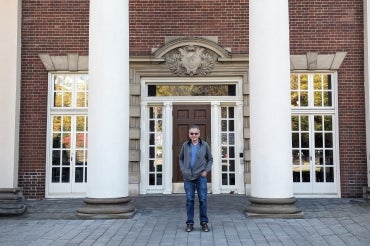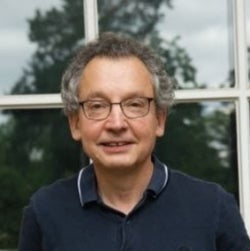U of T legal scholar honoured for contributions to legal philosophy, defending rule of law

David Dyzenhaus researches the idea of legality in philosophy of law and political thought, constitutionalism, and the modern legal state (photo by Nina Haikara)
Published: November 23, 2023
David Dyzenhaus’s scholarly interests were shaped during his legal studies at the University of the Witwatersrand in Johannesburg, at a time when South Africa’s apartheid regime held total sway.
“I thought there must be more to law than what a government with a total grip on power enacted, as lawyers were able to find legal resources to resist oppression and discrimination despite the fact that there was no written constitution,” says Dyzenhaus, a University Professor at the University of Toronto’s Faculty of Law and the Faculty of Arts & Science's department of philosophy.
“Lawyers… found legal resources despite all of this to resist what was being visited on the majority of South Africans by law. That made administrative law – a seemingly boring subject – very interesting.”

That feature of legal order led to a career-long fascination with the rule of law and administrative law, the substantive area of law he teaches.
Dyzenhaus’s exceptional contributions to his field were recognized with a Gold Medal from the Social Sciences and Humanities Research Council of Canada (SSHRC). The medal is the council’s highest honour and is awarded to an individual whose leadership, dedication and originality of thought have inspired students and colleagues.
“David is a renowned scholar and teacher, celebrated by peers and students alike,” said University Professor Jutta Brunnée, dean of the Faculty of Law. “It signals a lifetime of academic achievement and extraordinary expertise to receive this very special prize from the Social Sciences and Humanities Research Council of Canada.”
A fellow of the Royal Society of Canada and corresponding fellow of the British Academy, Dyzenhaus researches the idea of legality in philosophy of law and political thought, constitutionalism, and the modern legal state.
In the department of philosophy, he teaches an introductory course on the philosophy of law as well as undergraduate and graduate courses on political and legal philosophy. He also taught a first-year humanities seminar titled “Trump, the rule of law, and the rise of illiberal democracy”.
“Throughout his career, David has produced a body of work of unusual depth and importance.” said Professor Martin Pickavé, chair of the department of philosophy. “It is wonderful to see his rich research now recognized with one of the country’s most important national awards.”
For Dyzenhaus, who holds the Albert Abel Chair of Law, teaching and research go hand in hand. “I can't do research without talking to students about it, and I can't teach without it engaging directly with my interests,” he said.
He says questions in legal philosophy are often posed in an abstract way: What is law? What is legal order? But Dyzenhaus says many countries have “this thing simply known as ‘law’ and the issue for philosophy of law is to try to find an account of the nature of that thing.
“When it comes to the more difficult question – what is the rule of law – the simple answer is that one has the rule of law when the state acts in accordance with law,” he says. “So if the state enacts law, and then its officials abide by the law they implement, the real question becomes whether if, in so doing, officials do something that's morally worthwhile.”
This spring, Dyzenhaus will take his expertise to the London, U.K.-based Centre for Transnational Legal Studies – a joint venture between U of T’s Faculty of Law and 20 other premier law schools – where he will teach courses on the philosophy of judicial review and the politics of legal space. The latter course, which Dyzenhaus will co-teach with his former student Kirsten Rundle, a professor at Melbourne University’s law school, will examine the dilemmas human rights lawyers face and how these are shaped by the legal spaces in which they operate.
“Such lawyers know that when they're using legal resources to struggle against legalized oppression, they're not going to be able to overturn an oppressive regime and might actually help to legitimate it,” says Dyzenhaus.
His next research project will examine the social basis for law through the lens of social theory and sociology, and explore how individuals participate in society’s constitutional foundation.
"It’s not what people do in their daily lives, but what happens when they engage a lawyer, and through that lawyer, participate in the legal order,” Dyzenhaus said.



